Abstract
Game theory analyses multi-agent situations in which the payoff to an agent is dependent not only upon his own actions but also on the actions of others. Zero-sum games assume that the payoffs to the players always sum to zero. In that case, the interests of the players are diametrically opposed. In non-zero-sum games, there is typically room for cooperation as well as conflict.
Access this chapter
Tax calculation will be finalised at checkout
Purchases are for personal use only
Preview
Unable to display preview. Download preview PDF.
Bibliography
Axelrod, R. 1984. The Evolution of Cooperation. New York: Basic Books.
Benoit, J.-P. and Krishna, V. 1985. Finitely repeated games. Econometrica 53, 905–22.
Bernheim, B.D. 1984. Rationalizable strategic behavior. Econometrica 52, 1007–28.
Cournot, A.A. 1838. Researches into the Mathematical Principles of the Theory of Wealth. Trans. from French, New York: Macmillan, 1897.
Friedman, J.W. 1971. A non-cooperative equilibrium for supergames. Review of Economic Studies 38, 1–12.
Friedman, J.W. 1977. Oligopoly and the Theory of Games. Amsterdam: North-Holland.
Friedman, J.W. 1985. Cooperative equilibria in finite horizon noncooperative supergames. Journal of Economic Theory 35, 390–8.
Kalai, E. and Samet, D. 1984. Persistent equilibria in strategic games. International Journal of Game Theory 13, 129–45.
Kreps, D.M. and Wilson, R. 1982. Sequential equilibria. Econometrica 50, 863–94.
Moreaux, M. 1985. Perfect Nash equilibrium in finite repeated games and uniqueness of Nash equilibrium in the constituent game. Economics Letters 17, 317–20.
Myerson, R.B. 1978. Refinements of the Nash equilibrium concept. International Journal of Game Theory 7, 73–80.
Nash, J.F., Jr. 1950. Equilibrium points in n-person games. Proceedings of the National Academy of Sciences of the United States 36, 48–9.
Nash, J.F., Jr. 1951. Non-cooperative games. Annals of Mathematics 54, 286–92.
Pearce, D.G. 1984. Rationalizable strategic behaviour and the problem of perfection. Econometrica 52, 1029–50.
Schelling, T.C. 1960. The Strategy of Conflict. Cambridge, Mass.: Harvard University Press.
Selten, R. 1975. Reexamination of the perfectness concept for equilibrium points in extensive games. International Journal of Game Theory 4, 25–55.
Vorob’ev, N.N. 1977. Game Theory. New York: Springer-Verlag.
Editor information
Copyright information
© 1989 Palgrave Macmillan, a division of Macmillan Publishers Limited
About this chapter
Cite this chapter
Harrington, J.E. (1989). Noncooperative Games. In: Eatwell, J., Milgate, M., Newman, P. (eds) Game Theory. The New Palgrave. Palgrave Macmillan, London. https://doi.org/10.1007/978-1-349-20181-5_20
Download citation
DOI: https://doi.org/10.1007/978-1-349-20181-5_20
Publisher Name: Palgrave Macmillan, London
Print ISBN: 978-0-333-49537-7
Online ISBN: 978-1-349-20181-5
eBook Packages: Palgrave Economics & Finance CollectionEconomics and Finance (R0)

